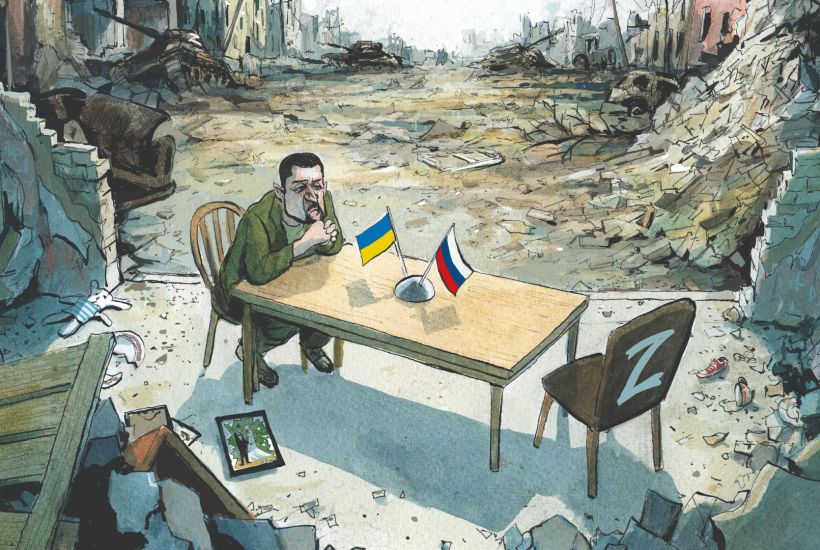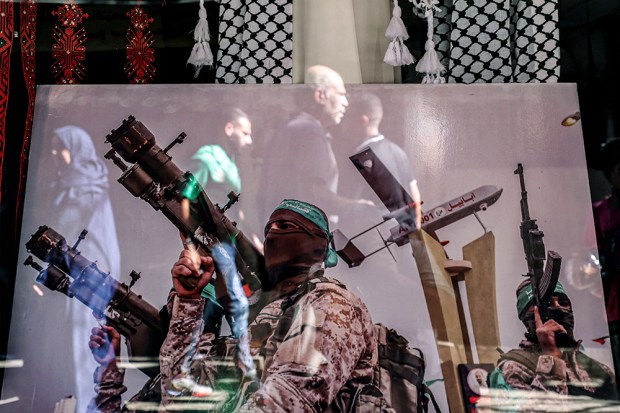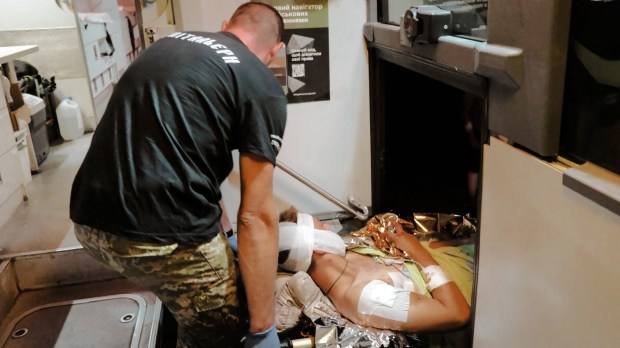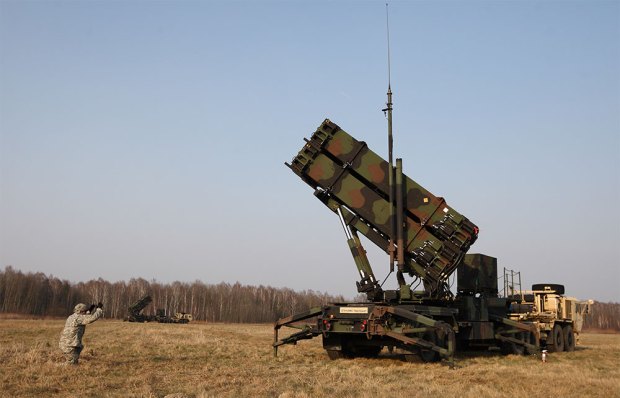‘Happy New Year! The year of our victory!’ said Volodymyr Zelensky on 1 January. After the liberation of the Kharkiv region and Kherson, Ukrainians entered the ninth year of the war with hope that they could win. Light will always prevail over darkness, Zelensky likes to say. But now the counter-offensive is nearly over, having made crushingly few gains. With western support waning, Kyiv needs to be honest about how the war is going and what it will take to turn the tide.
Ukrainians should be told that there is a shortage of soldiers and that mass conscription is urgently needed
After Zelensky, the most popular figure in Ukraine is Valery Zaluzhny, commander-in-chief of the military – and he has a very different message. Fighting has hit a ‘stalemate’, he told the Economist. A ‘beautiful breakthrough’ is not imminent and Ukraine should prepare for a long trench war requiring huge resources to make small gains.
Weapons do arrive, but too few and too late. The long-range missiles and tanks being received now would have been useful last year. When Ukraine innovates, as it did with its swarming drones, Russia simply copies – but at scale. Without a game-changer, Zaluzhny wrote, and without acquiring some new technological advantage, Ukraine won’t be able to win.
With this bombshell, he overturned Zelensky’s policy of sharing only positive narratives. The Ukrainian President’s optimism has always been partly tactical. If the West thinks Ukraine does not stand a chance, he thinks his allies may push him into ‘peace negotiations’. Ukrainians know from bitter experience, including the Minsk agreements, what peace with Russia means. It means Moscow has time to prepare for the next invasion.
Zelensky rushed to debunk Zaluzhny’s assessment. There is no ‘stalemate’, he said: his military is exploring new strategies for quicker progress. He also emphasised that Ukraine does not have any alternative other than to fight: ‘What to do about those people living in occupation? What to do about those thousands of people killed by Putin and his army? Just forget about it? No accountability, no tribunal?’
But Zelensky, here, has become a victim of the hype over the counter-offensive. Too many people expected a breakthrough when winter ended and the fighting season began again. Using Nato textbooks, Ukrainian forces thought it would take four months to ‘reach Crimea, fight in Crimea, and return’ (as Zaluzhny said). Talks about a ‘big push’ at first galvanised Ukraine’s allies into donating more arms. But then the troops got mired in minefields in the east and in the south. After five months of bloody fighting, Ukraine advanced only ten miles.
So expectations have turned to disillusion – dangerous for a president whose strategy is to keep the dream alive at all costs. Zelensky has depended on his charisma and his ability to turn a phrase. His much-quoted line – ‘I need ammo, not a ride’ – stood in the tradition of the finest war leaders and rallied the democratic world to Ukraine’s defence.
Optimism is one thing, but a Panglossian refusal to face hard facts is quite another, and dangerous too. Zelensky needs to tell Ukrainians that there is a shortage of soldiers on the front line and that mass conscription is urgently needed. But how can he reconcile this with the official message that victory is just around the corner?
A split is emerging between the soldiers on the front line who know how desperate things are, and the civilians in the cities who believe that the 700,000 people who have been drafted since last February are sufficient to win in some meaningful sense. I spent time on both sides of the divide earlier this year, and saw this perception gap for myself. The soldiers I talked to in the Donetsk region told me their brigades were so understaffed that they were not allowed home: some had been in the battlefield for 18 or even 20 months; others had spent more time at war than at home since 2014.
Last week, families protested in a dozen cities across the country, calling for a rotation in the troops and for demobilisation after 18 months of service. One kid was holding a sign, which read: ‘It’s my turn to hug father every day.’
But Ukraine cannot afford such a luxury. According to British intelligence’s assessment, we are in a first world war-style standoff because most of Ukraine’s mobilised troops are needed simply to maintain a front line that is now 700 miles long. There are few replacements for the fallen and wounded: the days of people queuing at recruitment offices are long gone.
A growing sense that conscription is eventually going to take every man means that about 200 Ukrainians are caught attempting to leave the country illegally each week. Approximately 16,500 have been stopped at the border since the start of martial law, but there are no estimates of how many have successfully stowed away on boats or trucks. The sight of military officers grabbing men on the street and dragging them into conscription centres only makes others more determined to escape.
In the next few weeks, we will begin to see the build-up to another wave of conscription, now called ‘recruitment’. Those who sign up next can choose for themselves what role they would like to take in the army. It is hoped and expected that this will improve people’s motivation: sign up and choose now, or risk being signed up later and given no choice. Not every role available means frontline fighting. There are jobs to be filled in communication and supplies.
The front line will need reinforcements – but that means a frank conversation with the public about the true state of the war. The battalions are thinning, soldiers are tired while fighting is constant. This week, for example, Russia has been trying to encircle Ukrainian troops in Avdiivka, a city in the Donetsk region. Just keeping the Russian army where it is is a struggle that requires the nation’s full efforts.
After seeing so much territory liberated last year, Ukrainians expected similar progress this year – and won’t settle for less now. Last month, a poll by the Kyiv International Institute of Sociology showed that 80 per cent believe that Ukraine should not give up any of its territories, Crimea included, even if it means prolonging the war..
Billboards and TV advertisements beg men to enlist, but why should anyone do so if people believe the Russian forces are ‘impotent’? People who think victory is certain want to plan for the future and for their children. They don’t risk their lives.
So the Ukrainian authorities have two choices: they can keep going with the boosterism and persist in trying to convince everyone that the fighting is going according to plan – or they can start an honest conversation about what’s actually happening.
It’s not just the Ukrainian authorities who avoid unpopular topics, but also the western allies, who crave the sight of heroic Ukrainian fighters making stunning advances, rather than struggling for every trench. Kyiv and Washington may discuss the war without embellishment in private but not in public – and to explain to the world why this war is so hard to win, and why Ukraine needs to continue to be given help anyway, puts at risk the patience and sympathy upon which Ukraine’s survival depends. There should be no shame in acknowledging the truth: Ukraine faces an enemy with superior weaponry, technology and manpower. The fact it has managed to thwart the advance of 400,000 Russian troops is an astonishing feat in itself. But to defeat these troops, to actually repel them from Ukrainian soil? We need to be upfront about how likely that now is.
The West needs to be honest with Ukraine too. As Markus Reisner, a colonel in the Austrian army, recently said: ‘We in the West became victims of our own propaganda – we thought it would work. We have forgotten about the essence of war.’
Reisner emphasised that the time had come to draw a line under the summer counter-offensive and concentrate on bolstering Ukraine’s preparation for another attempt in the spring. He sees only two options: the West must give Ukraine all the weapons it needs, without restrictions, or accept that victory is impossible. ‘Then we need to tell the Ukrainians this, and perhaps start negotiations,’ he added. ‘In that case, we must admit that the Ukrainian state in its current form may cease to exist, because Russia will destroy it.’
People who think victory is certain want to plan for the future. They don’t risk their lives
Reisner is quite right to rule out a third option of a peace deal that is in any sense stable or guarantees Ukrainian sovereignty. That was the deal that Kyiv signed in the Budapest Memorandum, which later turned out to be an exercise in appeasing Russian insecurities at the expense of Ukraine. To push Ukraine into a ‘peace deal’ with Russia that would mean it being partly taken over would guarantee more war to come. It would also demonstrate to the world that the post-war notion of borders being protected by treaties is no longer viable: whoever has the biggest army can take what he will.
And for Ukraine? Zelensky must talk frankly about the sacrifices that will be required to keep Russian forces at bay for another year. Ukrainians have shown their unity and resilience when they need to defend their homeland. The real question is the extent of the sacrifice everyone is willing to make – and what the most probable outcome will be if they choose not to pay that price any more.<//>
Got something to add? Join the discussion and comment below.
Get 10 issues for just $10
Subscribe to The Spectator Australia today for the next 10 magazine issues, plus full online access, for just $10.
You might disagree with half of it, but you’ll enjoy reading all of it. Try your first month for free, then just $2 a week for the remainder of your first year.














Comments
Don't miss out
Join the conversation with other Spectator Australia readers. Subscribe to leave a comment.
SUBSCRIBEAlready a subscriber? Log in